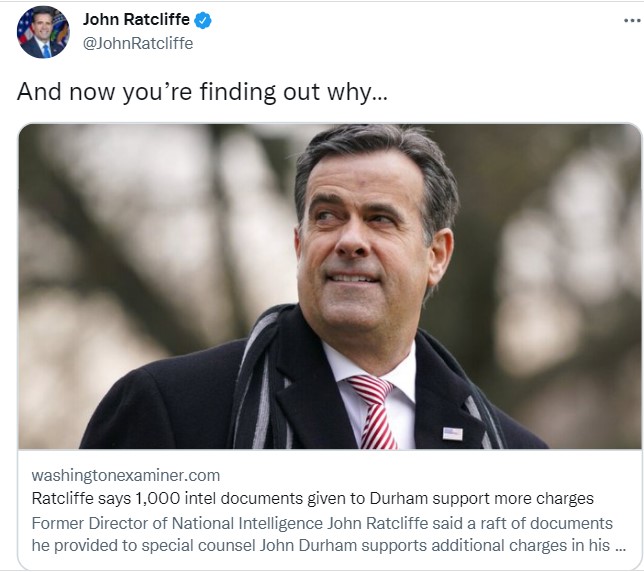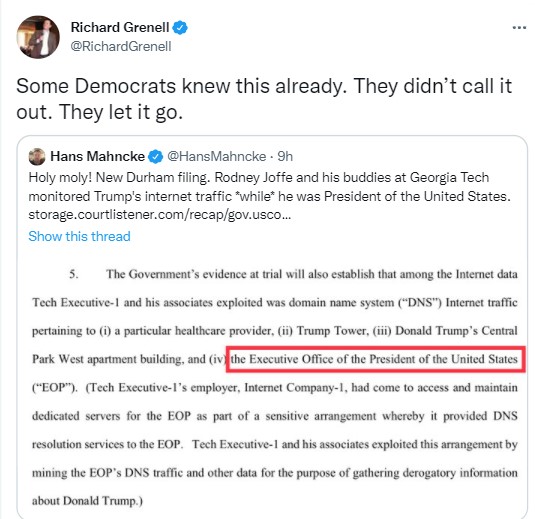Enemies of Donald Trump surveilled the internet traffic at Trump Tower, at his New York City apartment building, and later at the executive office of the president of the United States, then fed disinformation about that traffic to intelligence agencies hoping to frame Trump as a Russia-connected stooge.
A tangential filing on Friday in the criminal case against former Hillary Clinton campaign lawyer Michael Sussmann revealed these new details uncovered by Special Counsel John Durham’s investigation. The revelation came in the middle of a 13-page motion Durham’s prosecutors filed in the criminal case against Sussmann. The special counsel’s office charged Sussmann in September 2021, in a one-count indictment of lying to James Baker during a meeting Sussmann had with the then-FBI general counsel in the weeks leading up to the 2016 election.
During Sussmann’s September 19, 2016 meeting with Baker, Sussmann allegedly provided the FBI general counsel information that purported to show the existence of a secret communication channel between the Trump organization and the Russian Alfa Bank. The indictment charged that Sussmann told Baker during that meeting that he was not working on behalf of any client, when, according to the indictment, Sussmann was actually acting on behalf of “a U.S. technology industry executive at a U.S. Internet company”—later identified as Rodney Joffe—and “the Hillary Clinton Presidential Campaign.”
While the special counsel’s indictment of the Clinton campaign lawyer was, by itself, huge news, the details Durham sprinkled throughout the 27 pages of the talking indictment suggest even more bombshells are to come. Those allegations suggested “a scandal much deeper than merely Sussmann’s role in a second Russian hoax — a scandal that entangles the Clinton campaign, multiple internet companies, two federally-funded university researchers, and a complicit media.”
The Details Are Starting to Come Out
The talking indictment filed against Sussmann soon proved to be the first of many “talking” legal documents Durham’s team filed with the court. A little more than a month after charging Sussman, Durham filed a response to Sussmann’s “Motion for a Bill of Particulars”—a motion that asked the court to order Durham to provide more details about his alleged crime. That response revealed more details about Durham’s investigation.
A “discovery update” filed in late January added even more texture to the charge against Sussmann and the broader investigation. Durham exposed even more intrigue in the “clarification” to the discovery update he filed a few days later. In Friday’s motion, formally a “Motion to Inquire into Potential Conflicts of Interest,” Durham continued providing the public an update on select portions of the special counsel’s probe.
The special counsel’s office opened the motion by explaining that it believes Sussmann’s current counsel of Latham and Watkins, LLP may have potential conflicts of interests that could affect its representation of Sussmann. Those “potential conflicts likely could be addressed with a knowing and voluntary waiver by the defendant upon consultation with conflict-free counsel,” Durham’s team explained. But such a waiver, Durham requested, should be made “on the record” before trial.
Obtaining an on-the-record waiver by Sussmann of any such conflict of interest would limit Sussmann’s ability to later challenge any conviction, whether following a plea agreement or a jury verdict. The court will likely grant that motion to ensure both that any waiver of the conflict is knowing and voluntary and to ensure Sussmann cannot later attempt to overturn any conviction based on the conflict.
It is what followed in the next 12 pages, however, and not the mundane minutia of this motion, that proved explosive. In explaining the potential conflicts-of-interests Sussmann’s Lathan and Watkins attorneys possibly had, Durham explained much more of the get-Trump plot.
Yes, They Spied on Trump
To explain the potential conflicts, Durham began with the charge, noting as “factual background” that Sussmann, while serving as counsel to the Clinton campaign, met with FBI General Counsel Baker at FBI headquarters and provided Baker “purported data and ‘white papers’ that allegedly demonstrated a covert communications channel between the Trump Organization and a Russian-based bank.”
The motion then reiterated the indictment’s allegations that, beginning in approximately July 2016, Joffe worked with Sussmann, the opposition research firm Fusion GPS, and “numerous cyber researchers, and employees at multiple Internet companies to assemble the purported data and white papers.” “In connection with these efforts,” the motion continued, Joffe “exploited his access to non-public and/or proprietary Internet data.”
Joffe would then “task” researchers at Georgia Tech “to mine Internet data to establish ‘an inference’ and ‘narrative’ tying then-candidate Trump to Russia,” the motion read, with Joffe indicating “that he was seeking to please certain ‘VIPs,’ referring to individuals with the Clinton Campaign and Sussmann’s law firm at the time, Perkins Coie.”
Friday’s motion then, for the first time, revealed that the Internet data Joffe and his associates exploited “was domain name system (‘DNS’) Internet traffic pertaining to (i) a particular healthcare provider, (ii) Trump Tower, (iii) Donald Trump’s Central Park West apartment building, and (iv) the Executive Office of the President of the United States.”
The motion further stressed that Joffe’s internet company “had come to access and maintain dedicated servers for the EOP as part of a sensitive arrangement whereby it provided DNS resolution services to the EOP.” Joffe and his associates, the motion claimed, “exploited this arrangement by mining the EOP’s DNS traffic and other data for the purpose of gathering derogatory information about Donald Trump.”
According to the motion, Joffe did more than have his associates mine internet traffic at Trump Tower, Trump’s residential apartment building, and the executive office of the president of the United States—he gave that data to Sussmann, who provided it to the CIA during a February 9, 2017 meeting. During that meeting, Sussmann gave the CIA “data which he claimed reflected purportedly suspicious DNS lookups by Trump Tower, Trump’s residential apartment building, the EOP, and a healthcare provider, of internet protocol or IP addresses affiliated with a Russian mobile phone provided.”
According to Friday’s motion, Sussmann told the CIA during this meeting “that these lookups demonstrated that Trump and/or his associates were using supposedly rare, Russian-made wireless phones in the vicinity of the White House and other locations.”
Not only was there “no support for these allegations,” the motion explained, but the special counsel’s office obtained “more complete DNS data” from the company that assisted Joffe. It discovered that Joffe and his associates had gathered data showing that between 2014 and 2017 there were more than 3 million lookups of the Russian phone-provider’s IP address, but fewer than 1,000 originated with IPS addresses affiliated with Trump Tower.
Additionally, the data assembled by Joffe and his associates showed the DNS look-ups involving the EOP and the Russian cellphone provider “began at least as earlier as 2014 i.e., during the Obama administration and years before Trump took office.”
The data Sussmann shared with the CIA, however, omitted both these details. Sussmann also allegedly told the CIA he was not acting on behalf of any client when, according to Durham, Sussmann was, in fact, working for Joffe.
Joffe Knew Sussman Was Lying to the CIA
This revelation is huge. It means Joffe had data that disproved the very theory Sussman peddled to the CIA about Trump or his associates “using supposedly rare, Russian-made wireless phones in the vicinity of the White House and other locations.” Further, the CIA received only the misleading data and not the full analysis Joffe had commissioned.
Two added details confirm the significance of this revelation. First, shortly after news of the Sussmann indictment broke and while the press remained hyper-focused on the Alfa Bank angle, The New York Times gave Sussmann’s team an assist in getting ahead of the news by causally reporting about the targeting of Trump with DNS look-ups.
“The Alfa Bank suspicions were only half of what the researchers sought to bring to the government’s attention, according to several people familiar with the matter,” Charlie Savage and Adam Goldman reported for the Times in a September 30, 2021 article.
“Their other set of concerns centered on data suggesting that a YotaPhone — a Russian-made smartphone rarely seen in the United States — had been used from networks serving the White House, Trump Tower and Spectrum Health, a Michigan hospital company whose server had also interacted with the Trump server,” according to the Times article headlined “Trump Server Mystery Produces Fresh Conflict.” That article continued:
Mr. Sussmann relayed their YotaPhone findings to counterintelligence officials at the C.I.A. in February 2017, the people said. It is not clear whether the government ever investigated them.
The involvement of the researchers traces back to the spring of 2016. DARPA, the Pentagon’s research funding agency, wanted to commission data scientists to develop the use of so-called DNS logs, records of when servers have prepared to communicate with other servers over the internet, as a tool for hacking investigations.
DARPA identified Georgia Tech as a potential recipient of funding and encouraged researchers there to develop examples. Mr. Antonakakis and Mr. Dagon reached out to Mr. Joffe to gain access to Neustar’s repository of DNS logs, people familiar with the matter said, and began sifting them.
That “people familiar with the matter” would provide these details to the Times months before this angle of the investigation became public shows they knew it was huge and wanted the left-friendly press to frame this as a legitimate national-security issue, as opposed to the targeting of Trump.
‘Biggest Threat to American Democracy’
The second confirmation of the significance of Friday’s revelation comes from the response by those in the know, such as John Ratcliffe, who served as Trump’s director of national intelligence.
Within hours of #Durham trending on Twitter, Ratcliffe seemed to confirm the importance of these revelations, tweeting: “And now you’re finding out why. . .” along with a link to an article revealing Ratcliffe had directed the DNI to provide nearly 1,000 pages of material to the Department of Justice in response to a request by Durham for relevant documents. Ratcliffe further stated at the time that he believed those documents could support additional charges in the criminal probe into the Russian investigation.

Richard Grenell, who served as acting director of national intelligence for Trump, chimed in, noting that “some Democrats knew” Joffe was monitoring Trump’s internet traffic while he was president.

Mark Meadows, a former congressman who also served as chief of staff for Trump, soon joined the fray, tweeting out, “They didn’t just spy on Donald Trump’s campaign. They spied on Donald Trump as sitting President of the United States. It was all even worse than we thought.”
Kash Patel, who served as lead investigator for then-House Intelligence Committee Chairman Devin Nunes, added that the motion “shows that the Hillary Clinton campaign directly funded and ordered its lawyers at Perkins Coie to orchestrate a criminal enterprise to fabricate a connection between President Trump and Russia.”
Nunes concurred, telling The Federalist on Sunday, “There was no limit to the brazenness and vindictiveness of the Democrats’ illegal spying operation.” “In all my years as a member, ranking member, and chairman of the House Intelligence Committee,” Nunes added, “this is the single biggest threat to American democracy I’ve ever seen.”
By day’s end on Friday, Trump joined the fray, issuing a statement declaring “the latest pleading from Special Counsel Robert Durham provides indisputable evidence that my campaign and presidency were spied on by operatives paid by the Hillary Clinton Campaign in an effort to develop a completely fabricated connection to Russia.” “This is a scandal far greater in scope and magnitude than Watergate,” Trump continued, adding that “those who were involved in and knew about this spying operation should be subject to criminal prosecution.”

